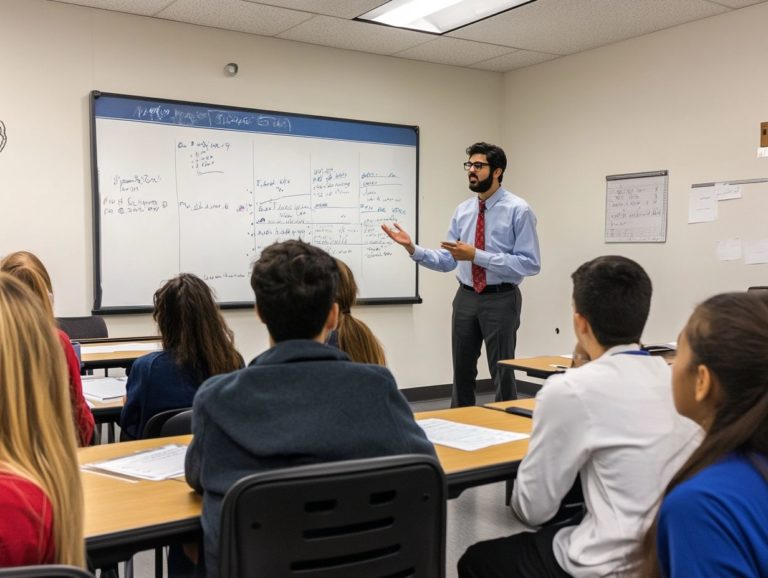what is the role of feedback in test preparation?
Feedback is essential for effective test preparation. It fundamentally influences how you engage with your study material and refine your skills.
Recognizing its significance can truly revolutionize your approach to learning. Feedback manifests in numerous forms, from verbal cues to written insights, each contributing uniquely to your growth.
This article delves into the various types of feedback and their impact on performance. It offers strategies for seamlessly integrating feedback into your study plan and tackles common challenges, empowering you to leverage feedback to enrich your learning journey.
Contents
Key Takeaways:

- Feedback is crucial for effective learning in test preparation.
- It helps students identify their strengths and weaknesses and make necessary improvements.
- Various types of feedback can be utilized, including verbal, written, and self-feedback, each with its own benefits and drawbacks.
- The impact of feedback on test performance can be both positive and negative, depending on the quality and delivery of the feedback.
- Using feedback effectively maximizes its benefits and avoids potential negative effects.
The Importance of Feedback in Test Preparation
In education, you cannot underestimate the value of feedback in test preparation. It is vital for enhancing student retention, boosting academic success, and nurturing engagement with course content.
Feedback functions as a dynamic loop. It informs instructional strategies and allows educators to fine-tune their teaching methods to address learners’ needs more effectively.
Research in psychology shows how impactful feedback fosters deeper learning and knowledge retention. This ultimately shapes the results of formative testing and performance assessments.
Why Feedback is Essential for Learning
Feedback is essential for your learning journey. It helps you develop skills to learn on your own and boosts your intrinsic motivation, making it a cornerstone of the educational process.
This vital element creates an active learning environment. You can engage deeply with your material, helping you understand it deeply instead of just memorizing it.
By receiving timely and constructive input on your performance, you gain invaluable insights into your strengths and areas needing improvement. This can help alleviate any test anxiety you might feel.
Research in psychology shows that this reflective practice encourages self-assessment and nurtures a growth mindset, giving you the power to take charge of your educational journey.
Effective feedback acts as your guiding compass. It enables you to navigate your learning path with confidence and resilience.
Types of Feedback in Test Preparation

You’ll encounter various forms of feedback in test preparation, such as verbal feedback, written feedback, self-feedback, and peer feedback.
Each type serves a distinct purpose, playing a crucial role in guiding your assessment and enhancing your performance.
Verbal, Written, and Self-Feedback
Verbal, written, and self-feedback each bring unique advantages to your educational journey. They help you engage more deeply with course content and improve your performance.
For instance, verbal feedback fosters dynamic interactions between you and teaching assistants. This allows for immediate clarification and nurtures a supportive learning atmosphere.
In settings like group discussions or presentations, real-time verbal responses can inspire you to participate more actively and refine your understanding on the spot.
On the other hand, written feedback is invaluable during performance reviews. It allows educators to meticulously outline your strengths and areas for growth, providing you with tangible insights to reflect on later.
By integrating both types of feedback, you can develop a well-rounded assessment strategy that gives you the power to explore your capabilities both in the moment and over time.
How Feedback Affects Test Performance
Feedback holds considerable power in shaping your test performance. Both positive and negative feedback can significantly affect your exam grades and influence your overall engagement with the learning material.
Understanding this dynamic can help you leverage feedback to enhance your educational experience.
Positive and Negative Impact of Feedback

Positive feedback plays a crucial role in reinforcing learning behaviors, promoting retention, and enhancing engagement. In contrast, negative feedback can sometimes spark anxiety and hinder performance assessment.
Consider this: when you highlight a student’s strengths, such as their distinctive approach to problem-solving, it boosts their confidence and inspires them to embrace risks in future tasks.
However, if feedback focuses solely on mistakes without offering constructive guidance, it can lead to discouragement and disengagement.
Cognitive psychology, which studies how we learn and think, indicates that balanced feedback celebrating accomplishments while providing specific suggestions for improvement can nurture a growth mindset. This approach helps students see challenges as learning opportunities instead of threats to their confidence.
Ultimately, this paves the way for improved academic outcomes.
Effective Strategies for Using Feedback
Use effective strategies to incorporate feedback into your learning process. This involves adding a feedback loop to your study plan and ensuring you receive frequent, real-time feedback throughout your journey.
Incorporating Feedback into Your Study Plan
<pAdding feedback into your study plan is essential for optimizing your instructional time and enhancing your academic performance, enabling you to implement targeted learning interventions.
By employing a systematic approach to integrate insights from assessments and peer reviews, you can significantly enrich your overall learning experience. Don t wait! Reflect on feedback immediately to pinpoint areas needing improvement and craft personalized study strategies.
Learning management systems (LMS) serve a pivotal role in this process. They provide tools for tracking your progress, facilitating communication between you and your instructors, and offering resources tailored to your unique learning style.
By thoughtfully combining feedback with the powerful features of an LMS, you can dynamically evolve your study plans, ensuring they stay aligned with your educational goals.
Maximizing the Benefits of Feedback

To truly benefit from feedback, align your teaching strategies with your students’ motivations and address any content gaps. This approach fosters an effective learning environment.
Incorporating regular check-ins and encouraging open communication can significantly enhance learner engagement. By actively seeking input from your students about their experiences, you can pinpoint which aspects of your teaching resonate most and which may require some refinement.
Using a variety of feedback mechanisms, like surveys or informal discussions, gives your students the power to share their perspectives freely. Tailoring your instructional methods to accommodate diverse learning preferences not only improves content delivery but also cultivates a more inclusive atmosphere.
Ultimately, the interplay between feedback and instructional practices can become a powerful catalyst for achieving improved educational outcomes.
Overcoming Challenges with Feedback
Navigating challenges with feedback, including resistance and criticism, is crucial for cultivating an environment that fosters effective learning and teaching strategies. By embracing this process, you can transform obstacles into opportunities, ultimately enhancing the educational experience for everyone involved.
Addressing Resistance and Criticism
Addressing resistance and criticism related to feedback is vital for maintaining your motivation and creating a positive learning environment. Open dialogue enhances this process significantly.
Incorporating peer feedback initiatives can create a comfortable space for sharing thoughts and insights. Utilizing principles from cognitive psychology helps reduce defensiveness and increase receptivity to constructive criticism.
For instance, framing feedback as a collaborative learning opportunity rather than a personal evaluation can effectively shift perspectives. By modeling positive feedback behaviors, you inspire others to engage openly, nurturing an environment where everyone thrives on shared knowledge and continuous improvement.
Frequently Asked Questions
What is the role of feedback in test preparation?
Feedback plays a crucial role in test preparation as it provides information on areas of improvement and helps identify strengths and weaknesses. Utilizing practice tests in preparation can enhance this feedback process significantly.
How does feedback help in improving test performance?
Feedback identifies specific areas where a student may need to focus, leading to a more targeted and effective study plan. It also builds confidence and motivation to perform better on the test.
What are the different types of feedback that can be received during test preparation?
The two main types of feedback are:
- Formative feedback: Helps you learn and improve during the learning process.
- Summative feedback: Evaluates your overall performance after the test.
How can one effectively use feedback in test preparation?
Reviewing feedback carefully can transform your study approach! Understand areas of improvement, set specific goals, and create a plan to work on those areas before the test.
Can feedback also come from self-assessment during test preparation?
Yes, self-assessment can be a valuable form of feedback, allowing students to reflect on their performance and identify areas for improvement. Be honest and critical when self-assessing to maximize its effectiveness.
Is feedback only beneficial for students who are struggling with test preparation?
No, feedback is beneficial for all students, regardless of their performance. It helps in understanding what works well and what can be improved, leading to better overall test performance.
Embrace feedback today and watch your performance soar!






